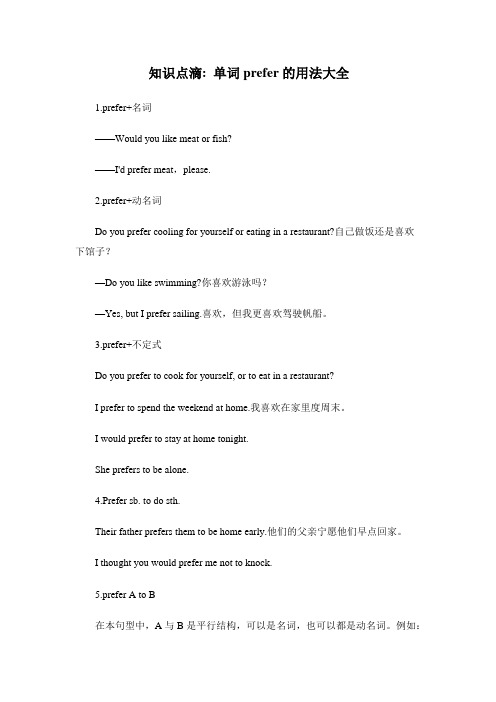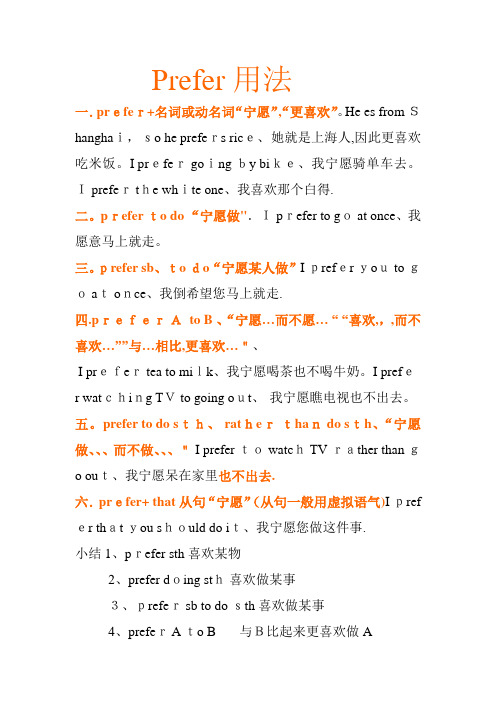(完整版)prefer的用法__(全)
prefer的用法及例句

prefer的用法及例句一、什么是"prefer""Prefer" 是一个常用的英语动词,它的意思是比较偏爱或更喜欢某个人或物品。
在日常生活中,我们经常使用这个词来表达自己对某些事物的选择和偏好。
二、 "prefer" 的基本用法1. "prefer" 用作及物动词时,后面通常接名词、代词或动名词。
例如:a) I prefer tea to coffee.(我比较喜欢茶而不是咖啡。
)b) She prefers reading books to watching TV.(她喜欢读书胜过看电视。
)2. 当 "prefer" 后面跟随不定式时,句子结构为:prefer + 不定式基本形式(to do)或:prefer + 动词-ing 形式(to doing)。
例如:a) I prefer to stay at home rather than go out tonight.(与其出去今晚,我更愿意待在家里。
)b) He prefers swimming over running for exercise.(他更喜欢游泳而不是跑步锻炼身体。
)3. "prefer" 还可用于表示对时间的偏好,例如:a) I would prefer to meet in the morning if possible.(如果可能的话,我更愿意在早上见面。
)b) They prefer to have breakfast early in the day.(他们喜欢早上很早吃早餐。
)4. 对于 "prefer" 的否定形式,可使用 "not prefer" 或 "prefer not to",例如:a) I do not prefer spicy food.(我不喜欢辣食。
prefer的用法大全

知识点滴: 单词prefer的用法大全1.prefer+名词——Would you like meat or fish?——I'd prefer meat,please.2.prefer+动名词Do you prefer cooling for yourself or eating in a restaurant?自己做饭还是喜欢下馆子?—Do you like swimming?你喜欢游泳吗?—Yes, but I prefer sailing.喜欢,但我更喜欢驾驶帆船。
3.prefer+不定式Do you prefer to cook for yourself, or to eat in a restaurant?I prefer to spend the weekend at home.我喜欢在家里度周末。
I would prefer to stay at home tonight.She prefers to be alone.4.Prefer sb. to do sth.Their father prefers them to be home early.他们的父亲宁愿他们早点回家。
I thought you would prefer me not to knock.5.prefer A to B在本句型中,A与B是平行结构,可以是名词,也可以都是动名词。
例如:I prefer dogs to cats.在狗与猫之间我更喜欢狗。
Most people prefer trains to buses.大多数人愿意坐火车而不愿坐汽车。
I prefer writing a term paper to taking an examination.我宁愿写一篇学期论文也不愿参加考试。
I prefer staying at home to going out.我觉得在家里比出去好。
Thousands of children nowadays prefer doing their homework to a backgroundof pop-music to doing it in a quiet room.成千上万的孩子如今一边听流行音乐一边做作业,也不愿在安安静静的房间里做。
prefer的全部用法

prefer的全部用法prefer + 名词;prefer + 动名词;prefer + 不定式;prefer + 宾语+ 不定式(充当宾语补足语);prefer + 名词性成分(to/rather than + 名词性成分);prefer sb to do。
一、prefer + 名词prefer sth (to sth)只表达喜欢某一个事物时,括号里的成分省略;涉及两个事物比较时,加上括号里的成分。
下同。
具体如下:1、prefer sthDoes he prefer a particular sort of music?他更喜欢某种特别的音乐吗?2、prefer sth to sth elseI prefer tea to coffee.相比咖啡,我更喜欢茶。
二、prefer + 动名词prefer doing (to doing)具体如下:1、prefer doingI prefer watching TV at lunch.我喜欢在吃午饭时看电视。
2、prefer doing sth to doing sth elseI prefer staying at home to strolling outside.我喜欢在家待着,而不喜欢在外面闲逛。
三、prefer + 不定式prefer todo (rather than do)具体如下:1、prefer to doI prefer to stay at home = I prefer staying at home.即prefer to do 和prefer doing 可以互换,可以认为意思没有区别。
2、prefer to do rather than doI prefer to stay at home rather than stroll around = I prefer staying at home to strolling around.即prefer to do rather than do = prefer doing to doing.以上三种用法可以进一步概括为“prefer 搭配名词性成分(名词、动名词、不定式) 的用法”。
prefer的用法__(全)

Prefer用法一.prefer+名词或动名词“宁愿”,“更喜欢”。
He es from Shanghai,so he prefers rice、她就是上海人,因此更喜欢吃米饭。
I prefer going by bike、我宁愿骑单车去。
I prefer the white one、我喜欢那个白得.二。
prefer to do “宁愿做".I prefer to go at once、我愿意马上就走。
三。
prefer sb、to do “宁愿某人做” I prefer you to go at once、我倒希望您马上就走.四.preferAto B 、“宁愿…而不愿…““喜欢,,,而不喜欢…””与…相比,更喜欢…"、I prefer tea to milk、我宁愿喝茶也不喝牛奶。
I prefer watching TV to going out、我宁愿瞧电视也不出去。
五。
prefer to do sth、 ratherthan do sth、“宁愿做、、、而不做、、、" I prefer to watch TV rather than go out、我宁愿呆在家里也不出去.六.prefer+ that从句“宁愿”(从句一般用虚拟语气)I pref er that you should do it、我宁愿您做这件事.小结1、prefer sth 喜欢某物2、prefer doing sth喜欢做某事3、prefer sb to do sth 喜欢做某事4、prefer A to B 与B比起来更喜欢做A5、prefer doing A to doing B与做B比起来喜欢A6、prefer to do A rather than do B 喜欢做A,不喜欢作B7、prefer to doA than do B 喜欢做A,不喜欢作B 练习:1、I preferwalking alone、我喜欢一个人溜达。
prefer的用法 (全)

prefer得用法一、后接不定式时与rather than 或instead of连用,如:He preferred to die rather than (to) steal、 / He perferred to die instead of stealing、她宁死也不去偷窃。
二、注意介词搭配,如: I prefer swimming to skating、(I like swimming betterthan skating、)我喜欢游泳胜过滑冰。
prefer 因其本身含有比较之意,而不可再与more 或most连用。
三、prefer+名词或动名词“宁愿”,“更喜欢”。
He es from Shanghai,so he prefers rice、她就是上海人,因此更喜欢吃米饭.I prefer going by bike、我宁愿骑单车去。
I preferthe white one、我喜欢那个白得。
四、prefer to do“愿意做”。
I prefer to go at once、我愿意马上就走。
五、prefer sb、to do “愿意某人做” I prefer you to go at once、我倒希望您马上就走。
六、prefer to sth、“宁愿做、、、而不做、、、”、 I prefer t ea to milk、我宁愿喝茶也不喝牛奶。
I prefer watching T V to going out、我宁愿瞧电视也不出去.七、prefer to do sth、 rather than do sth、“宁愿做、、、而不做、、、” I prefer to watch TV rather than go out、我宁愿呆在家里也不出去.八、prefer+ that从句“宁愿”(从句一般用虚拟语气)I prefer that you should do it、我宁愿您做这件事。
不能说prefer sth rather than sth九、prefer+名词或动名词“宁愿",“更喜欢”.He es f rom Shanghai, so he prefers rice、她就是上海人,因此更喜欢吃米饭.I prefer going by bike、我宁愿骑单车去。
prefer的用法及例句

prefer的用法及例句"prefer" 是一个动词,表示偏爱、更喜欢或优先选择某个选项或行为。
下面是一些关于 "prefer" 的用法和例句:1. "prefer" 可以直接接名词或代词作为宾语:- I prefer coffee over tea.(我更喜欢咖啡而不是茶。
)- She prefers reading books to watching movies.(她更喜欢读书而不是看电影。
)2. "prefer" 也可以接动词的-ing形式作为宾语:- He prefers swimming to running.(他更喜欢游泳而不是跑步。
)- They prefer playing soccer rather than basketball.(他们更喜欢踢足球而不是打篮球。
)3. "prefer" 还可以接从句作为宾语:- We prefer that you arrive on time.(我们希望你准时到达。
)- She prefers it when he cooks dinner.(她更喜欢他做晚饭。
)4. "prefer" 也可以用于比较级结构中,表示更喜欢某个选项:- I prefer this book to that one.(我更喜欢这本书而不是那本。
)- They prefer the blue car over the red one.(他们更喜欢蓝色的车而不是红色的那辆。
)需要注意的是,"prefer" 后面通常会使用介词 "to" 或 "over" 来引导所偏爱的选项。
希望以上回答能满足你的需求。
如果你还有其他问题,请随时提出。
prefer的用法总结

prefer的用法总结prefer有更喜欢;宁愿等意思,那么你知道prefer的用法都有哪些吗?下面学习啦小编为大家带来prefer的用法总结,希望对大家学习英语有所帮助!prefer的用法prefer的用法1:可用于多种形式的复合结构(宾语补足语可以是形容词、介词短语、过去分词、不定式等)。
如:I prefer my coffee black. 我喜欢喝不加奶的咖啡。
I prefer the chair in its old place. 我觉得这把椅子还是放在老地方好。
We preferred the house painted white 我们倒喜欢那座漆成白色的房子。
Their father prefers them to be home early. 他们的父亲希望他们早点儿回家。
prefer的用法2:用作动词,表示“更喜欢”“宁愿”等,后接动词时,可用不定式或动名词,其区别大致为:表示一般情况用动名词,表示特定动作用不定式。
比较:I prefer walking alone. 我喜欢一个人溜达。
A:Can I give you a lift? 你顺便坐我的车走吗?B:No, thanks. I prefer to walk. 不用了,谢谢,我喜欢步行。
但是,与would或should连用时,总是表示特定的想法,所以其后总是接不定式。
如:正:We would prefer to do it later. 我们宁愿以后做它。
误:We would prefer doing it later.另外注意,当would prefer后接不定式被省略时,要注意保留其中的to,如:A:Would you prefer to wait? 你愿意等吗?B:Yes, I’d prefer to. 是的,愿意等。
prefer的用法3:其后有时接that从句作宾语,从句谓语动词通常用虚拟语气(用过去式或用should+v)。
prefer的用法 (全)精编版

prefer的用法一、后接不定式时与rather than 或instead of连用,如:He preferred to die rather than (to) steal. / He perferred to die ins tead of stealing. 他宁死也不去偷窃。
二、注意介词搭配,如: I prefer swimming to skating. (I like swimming better than skating.)我喜欢游泳胜过滑冰。
prefer 因其本身含有比较之意,而不可再与more 或most连用。
三、prefer+名词或动名词“宁愿”,“更喜欢”。
He comes from Shanghai, so he prefers rice. 他是上海人,因此更喜欢吃米饭。
I prefer going by bike.我宁愿骑单车去。
I prefer the white one.我喜欢那个白的。
四、prefer to do “愿意做”。
I prefer to go at once.我愿意马上就走。
五、prefer sb. to do “愿意某人做” I prefer you to go at once.我倒希望你马上就走。
六、prefer to sth.“宁愿做...而不做...”. I prefer tea to milk.我宁愿喝茶也不喝牛奶。
I prefer watching TV to going out. 我宁愿看电视也不出去。
七、prefer to do sth. rather than do sth.“宁愿做...而不做...” I prefer to watch TV rather than go out.我宁愿呆在家里也不出去。
八、prefer+ that从句“宁愿”(从句一般用虚拟语气)I prefer that you should do it.我宁愿你做这件事。
- 1、下载文档前请自行甄别文档内容的完整性,平台不提供额外的编辑、内容补充、找答案等附加服务。
- 2、"仅部分预览"的文档,不可在线预览部分如存在完整性等问题,可反馈申请退款(可完整预览的文档不适用该条件!)。
- 3、如文档侵犯您的权益,请联系客服反馈,我们会尽快为您处理(人工客服工作时间:9:00-18:30)。
Prefer用法
一.prefer+名词或动名词“宁愿”,“更喜欢”。
He comes from Shanghai, so he prefers rice. 他是上海人,因此更喜欢吃米饭。
I prefer going by bike.我宁愿骑单车去。
I prefer the white one.我喜欢那个白的。
二.prefer to do “宁愿做”。
I prefer to go at once.我愿意马上就走。
三.prefer sb. to do “宁愿某人做” I prefer you to go at once.我倒希望你马上就走。
四.prefer A to B .“宁愿…而不愿…““喜欢,,,而不喜欢…””与…相比,更喜欢…”.
I prefer tea to milk.我宁愿喝茶也不喝牛奶。
I prefer watching TV to going out. 我宁愿看电视也不出去。
五.prefer to do sth. rather than do sth.“宁愿做...而不做...” I prefer to watch TV rather than go out.我宁愿呆在家里也不出去。
六.prefer+ that从句“宁愿”(从句一般用虚拟语气)I prefer that you should do it.我宁愿你做这件事。
小结1.prefer sth 喜欢某物
2.prefer doing sth 喜欢做某事
3.prefer sb to do sth 喜欢做某事
4.prefer A to B 与B比起来更喜欢做A
5.prefer doing A to doing B
与做B比起来喜欢A
6.prefer to do A rather than do B 喜欢做A,不喜欢作B
7.prefer to do A than do B 喜欢做A,不喜欢作B
练习:
1.I prefer walking alone. 我喜欢一个人溜达。
A:Can I give you a lift? 你顺便坐我的车走吗?
B:No, thanks. I prefer to walk. 不用了,谢谢,我喜欢步行。
2.We would prefer to do it later. 我们宁愿以后做它。
3.A:Would you prefer to wait? 你愿意等吗?
B:Yes, I’d prefer to. 是的,愿意等。
4.I prefer my coffee black. 我喜欢喝不加奶的咖啡。
5.I prefer the chair in its old place. 我觉得这把椅子还是放在老地方好。
6.We preferred the house painted white 我们倒喜欢那座漆成白色的房子。
7.Their father prefers them to be home early. 他们的父亲希望他们早点儿回家。
8.I prefer the seaside to the mountains. 我喜欢海边,不喜欢山区。
9.Tom prefers reading to talking. 汤姆喜欢读书而不喜欢谈天。
10.We’d prefer playing outdoors to watching television. 我们宁愿在外面玩而不愿看电视。
11.He prefers to read rather than watch television. 他喜欢读书而不喜欢看电视。
12.She preferred to stay at home rather than (to) go out. 和出门比起来,她比较喜欢待在家里。
13.I would prefer to spend the weekend at home rather than driving all the way to your mother’s. 我觉得与其开车跑那么远到你母亲那里去度周末,倒不如在家过更好些。
14.I should prefer beef rather than mutton. 我宁愿吃牛肉而不愿吃羊肉。
15.I prefer swimming rather than cycling. 比起骑自行车来我还是喜欢游泳。
16.He preferred that such comments should cease. 他希望停止这种议论。
17.I would prefer it if you didn’t smoke in here. 我希望你不要在这里面吸烟。
18.I would prefer it if you didn’t tell anyone. 我希望你别告诉任何人。
19.I would prefer that you did not mention my name. 我倒希望你不要提及我的名字。
20.I should prefer that you did not go there alone.
21.I should prefer it if you did not go there alone.
22.I should prefer you not to go there alone.
23.I far prefer swimming to cycling. 我喜欢游泳远胜于骑自行车。
24.We much prefer the country to the town. 我们喜欢乡下,不怎么喜欢城里。
would you like...? 是表示礼貌的请求、提议或邀请,而不是提出疑问。
如:
(1) A: Would you like some milk? 要喝点牛奶吗?
B: Thanks, but I’d prefer coffee, if there is any. 谢谢,但我想喝点咖啡,如果有的话。
(2) Would you like to stay at home today? 今天呆在家里好吗?
(3)Would you like to have a cup of tea / coffee? (喝杯茶/ 咖啡吧。
)or Would you like a cup of tea?
Would you like to have some orange juice? (喝点桔汁吧。
)
而do you like... 只是询问对方通常喜欢什么或喜欢做什么。
Would you like some...多用于吃东西时劝别人吃点其他的东
西……
比如:
Would you like some cake? 你要吃点蛋糕吗?Would you like some chocolate? 要些巧克力吗?Would you like some coffee? 您要来点儿咖啡吗?Yes, I’d like/love to.
No, thanks.。
